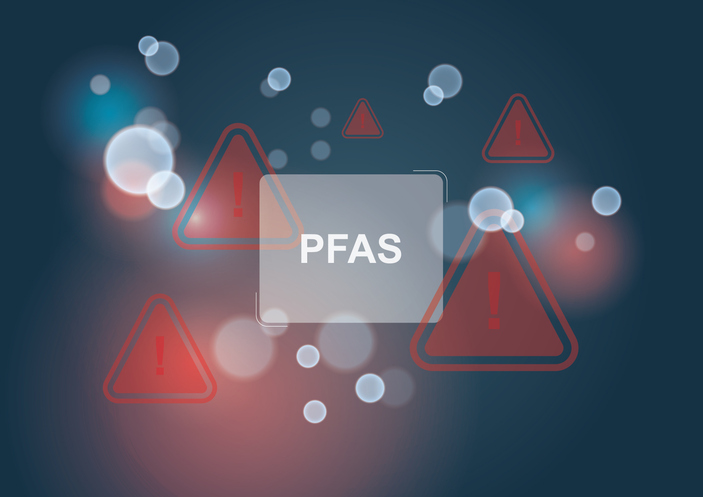PFAS Consulting & Due Diligence: Navigating Emerging Risks with Confidence

Your Trusted Partner for PFAS Investigation, Regulatory Guidance, and Risk Mitigation
Per- and polyfluoroalkyl substances (PFAS), often referred to as “forever chemicals,” have become one of the most significant emerging concerns in environmental due diligence. Used since the 1940s for their resistance to water, grease, and heat, PFAS are now known for their persistence in the environment and potential health impacts. As regulatory agencies tighten enforcement and lower detection limits, identifying and managing PFAS has become a crucial part of responsible property transactions, redevelopment planning, and ongoing site management.
At Hillmann, our PFAS Consulting & Due Diligence services are designed to help clients understand, mitigate, and manage PFAS-related risks. Whether you’re acquiring a property, refinancing an asset, or managing redevelopment, our team provides the insight and support you need to make informed decisions in a rapidly evolving regulatory landscape.
Understanding PFAS and Their Impact
PFAS are a group of thousands of synthetic chemicals used across numerous industries, from metal plating and textiles to electronics and firefighting foams. Their widespread use — coupled with their resistance to breaking down — has led to contamination in soil, groundwater, surface water, sediment, biosolids, and even air.
In 2024, the U.S. Environmental Protection Agency (USEPA) designated two well-known PFAS compounds — Perfluorooctanoic Acid (PFOA) and Perfluorooctane Sulfonate (PFOS) — as CERCLA hazardous substances. This landmark decision means that PFAS releases:
- Must now be considered Recognized Environmental Conditions (RECs) during Phase I Environmental Site Assessments.
- May trigger reporting requirements and potential cleanup obligations.
- Could impact past site closure determinations and financing eligibility.
For property owners, developers, lenders, and investors, this shift changes the due diligence landscape — making PFAS consideration not just best practice, but essential.
Our PFAS Consulting & Due Diligence Services
Hillmann integrates PFAS assessment into every phase of environmental due diligence and risk management. Our comprehensive services include:
- PFAS Risk Screening & Records Review – We identify potential PFAS risks through historical site use, operational practices, and regulatory databases, highlighting potential exposure risks early in the transaction process.
- Phase I ESA with PFAS Considerations – Our Phase I assessments consider PFAS in the evaluation of RECs, ensuring your due diligence meets current CERCLA standards and anticipates potential liabilities.
- Targeted Phase II PFAS Sampling & Analysis – When warranted, we conduct high-resolution sampling of soil, groundwater, and sediment at parts-per-trillion detection limits, providing a clear picture of site conditions and potential migration pathways.
- Regulatory Guidance & Compliance Strategy – We diligently monitor the evolving federal and state PFAS regulations and help you interpret guidance, manage compliance obligations, and plan for potential future actions.
- Transaction & Redevelopment Support – Our team helps clients understand how PFAS risk could impact acquisitions, financing, and redevelopment, offering strategic insights into risk allocation and mitigation approaches.
How PFAS Can Affect Your Project
PFAS considerations are critical in certain scenarios:
- Industrial Properties: Facilities associated with manufacturing, plating, or firefighting foam use may require additional Phase II testing.
- Sites Near Fire-Training Areas or Military Bases: PFAS plumes can migrate off-site, potentially affecting groundwater resources.
- Agricultural Crop Fields: Biosolids applied as fertilizer may contain elevated PFAS.
- Closed Remediation Cases: Previously “closed” dry cleaning and industrial cleanup sites could be reopened and require new investigation if PFAS are detected.
- Refinancing Transactions: Properties once considered compliant may now be subject to further evaluation due to new regulatory standards.
Proactively addressing PFAS during due diligence helps reduce the risk of costly surprises, project delays, and future liabilities.
Why Partner with Hillmann
With over 40 years of environmental consulting experience, Hillmann is a trusted advisor to developers, property owners, lenders, and investors nationwide. Our approach to PFAS Consulting & Due Diligence is rooted in technical expertise, regulatory insight, and practical experience, ensuring clients receive the information they need to make confident, well-informed decisions.
We don’t just identify risks — we help you manage them strategically, protecting both your investment and your long-term project goals.
Contact Hillmann today to learn how our PFAS Consulting & Due Diligence services can support your next transaction, redevelopment project, or environmental compliance effort. 📧 info@hillmann.com
-

Understanding C-PACE Financing for Developers and Building Owners
February 24, 2026
-

Commercial Real Estate Consulting Services
February 2, 2026
-

Philadelphia Building Energy Performance Program (BEPP)
January 28, 2026
-

Hillmann’s Modular Construction Expertise
December 1, 2025
-

-

Disbursement Services for Construction Lending
August 27, 2025
